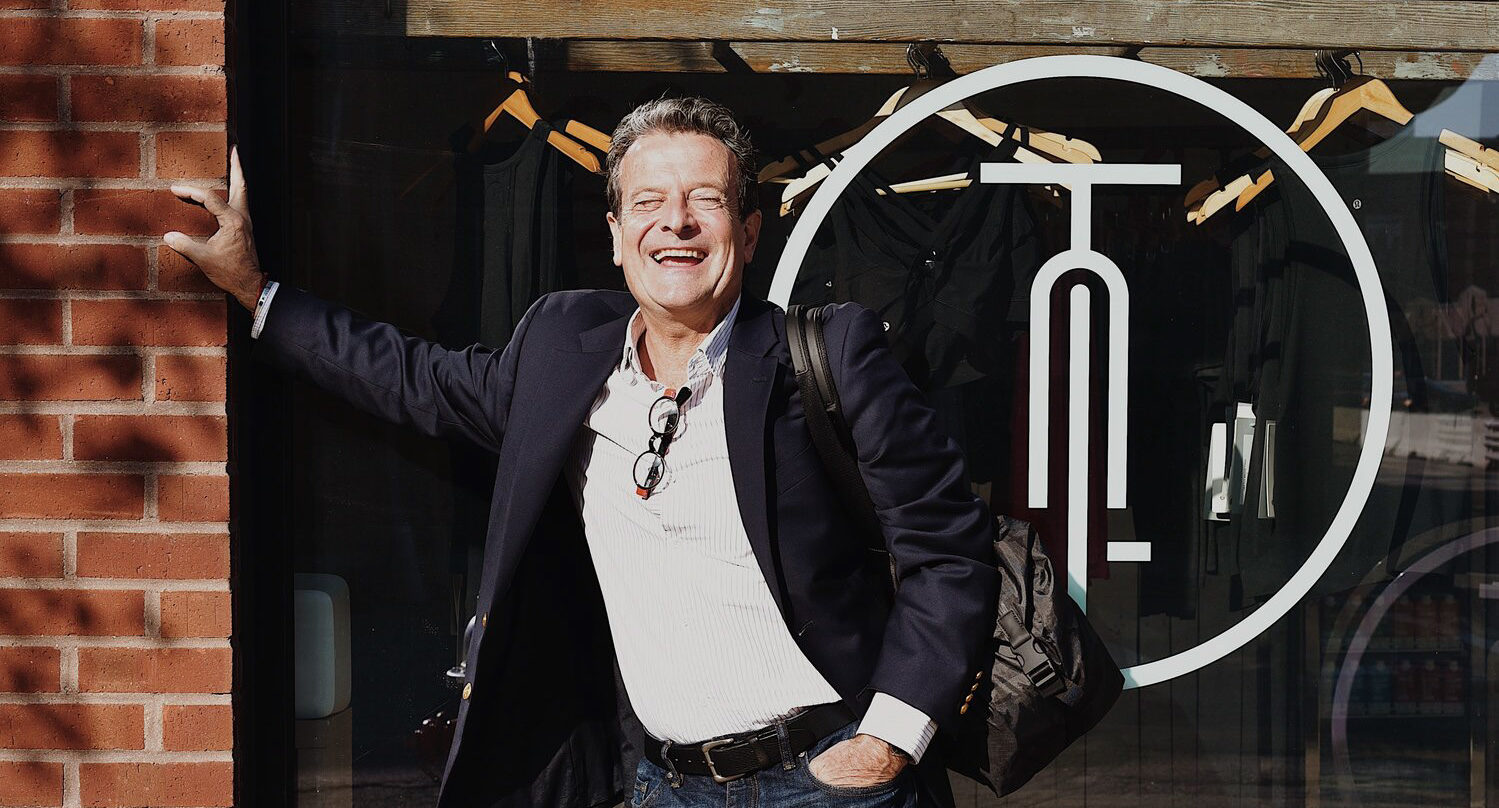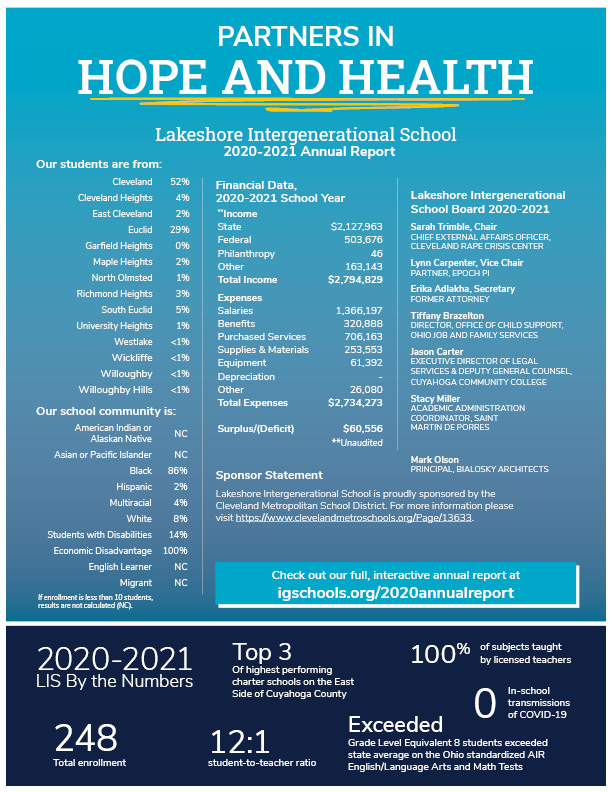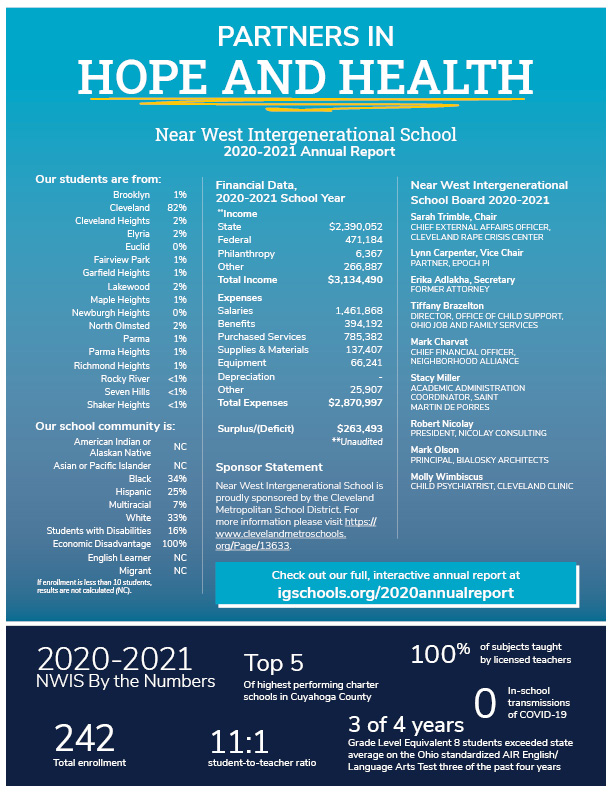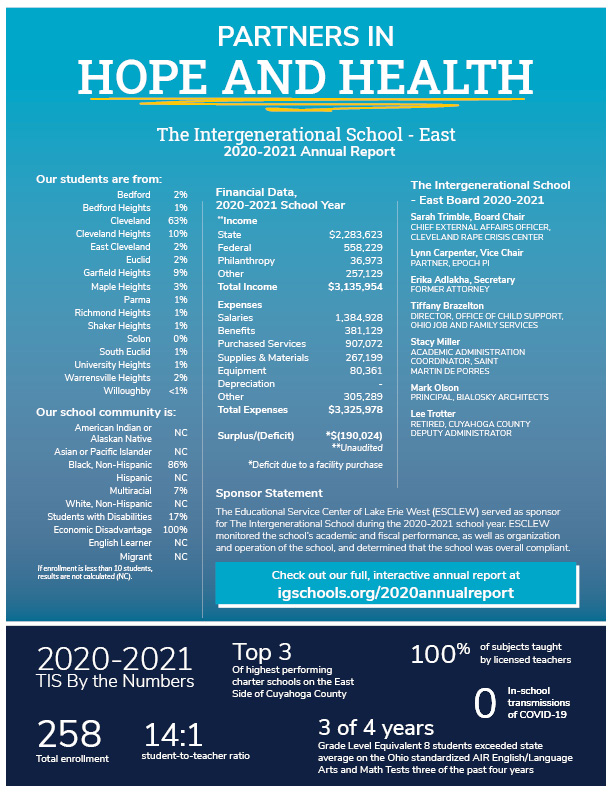Partners in
Hope and Health
2020-2021 Annual Report
Meeting more than the moment.
Over the course of this past school year, the Intergenerational Schools reopened their doors to the community, welcoming students into classroom settings that felt unfamiliar: everyone in masks, with social distancing and no shared tools or supplies. But despite the surface-level incongruities, our work in coordination with the broader community underscored what it means to be an intergenerational school.
Amidst the pandemic and learning loss, in response to the growing racial unrest of the past year, the Intergenerational Schools made commitments to our community to deliver on hope and health, and to foster a school culture that thrives on collaboration and strengthens the whole community by calling on, nurturing and elevating the innate strengths of people within it. As life as we know it continues to change, the Intergenerational Schools have made a commitment to our communities: We are partners in Hope and Health.
This year’s annual report explores how we work together towards these goals.
A Message from Our Executive Director
Dear Friends,
While the onset of the pandemic pushed us all to adapt in new ways, 2020-2021 gave us abundant opportunities to practice this skill and to develop resilience in the face of sustained uncertainty. While the school year began with 100% remote learning, we eventually reopened our doors and welcomed students into classroom settings that felt unfamiliar: everyone in masks, with social distancing, no sharing of tools or supplies, and about half of their classmates remaining remote. But despite the surface-level peculiarities of this past year, our shared experiences underscored what it means to be an intergenerational school.
Amidst the stress and time lost in school, and in response to the growing racial unrest of the past year, the Intergenerational Schools made commitments to our community to focus on Hope and Health, and to continue to foster a culture that strengthens the school community by engaging, nurturing and elevating the innate strengths of the people within it. This year’s annual report explores how we worked together towards these ideals during a difficult time.
The theme of Hope and Health emerged from a virtual lecture series of the same name that we launched in February 2020 to have open discussions around topics like “education and minority health,” “making connections across generations,” and “engaging our communities.” We invited esteemed local and national guest speakers in who were interviewed by our very own students and alumni for some very interesting and uplifting discussions.
Each day of 2020-2021 was a testament to Hope and Health. We kept each other safe, we continued to meet students where they are, and we learned more about and from each other than in a typical year. I couldn’t be prouder of our teachers and staff, our students, our families and our volunteers for the countless ways they met the moment last year and continue to today.
With gratitude,
Brooke King
Executive Director, Intergenerational Schools
Intergenerational:
at school, at home and in the community.
stories from the year
A World in Their Hands
Building Home Libraries and Community Connections
In October 2020, the Collaborative Fund for Educating Remotely and Transforming Schools awarded the Intergenerational Schools a $124,000 grant to launch A Family Approach to K-3 Literacy, a reading program that will have long-term positive outcomes for reading instruction at our schools for years to come.
While our response to the initial pandemic shutdown during the 2019-2020 school year ensured our students had the technology necessary to learn at home, the lack of shared resources and extended virtual learning setting for this past school year posed another challenge: It kept our students away from one of their favorite (and most important) resources, the school library.
“In school, every Wednesday students go to the library to swap out the books in their classroom book bins,” said Molly Toussant, Director of Curriculum for the Intergenerational Schools. “We soon came to realize that many of our kids didn’t have access to books beyond what we sent home with them. All the public libraries and bookstores were still closed. Whatever the family had was what the students had access to.”
Toussant and her colleagues designed A Family Approach to K-3 Literacy to maintain effective reading instruction through three strategies: setting up home libraries for students in the most critical stages of learning to read, developing teachers’ skills in delivering personalized reading instruction, and establishing a training program for learning partners to support a community of effective, culturally competent reading education.
The Right Stuff: Not Just Any Books
“Putting a book into the hands of a child is not that simple,” Toussant said. “You want to make sure that three-fourths of the books kids are reading are at their level, that they address their interests, and that representation of characters matches who they are and what they experience in life.”
Rather than rely on programs that offer used children’s books without vetting, we needed to work with our teachers to meet the needs and interests of each student.
Through A Family Approach to K-3 Literacy, the Intergenerational Schools provided a total of 16,185 books to 440 students, reaching all students in the Emerging Stage, Beginning Stage and Developing Stage across our three schools. Most of these books arrived through the mail in early 2021, as Cuyahoga County’s COVID numbers remained too high for the school to reopen through most of February.
These special deliveries reignited excitement around reading across the schools; students were eager to discuss their books with their peers, teachers and learning partners. These home libraries joined a growing array of approaches to building connections between school and family.
-
16,185
books were distributed
-
100%
of K-4 students received books
-
440
K-4 students received books
-
35
books for each student
-
86
Learning Partners read with students
-
845
Hours of 1:1 reading with students and Learning Partners
-
54%
of participating students are on track for reading level expectations*
Learning Partners Return to the Intergens
Learning partners have been a hallmark of the Intergenerational Schools for over 20 years. The role learning partners play is deeper than a reading buddy or tutor. Through a shared love of learning, they form bonds with students that last for years, providing an additional and consistent layer of support within the schools. “It takes a village and to me Intergenerational Schools is a good village to be a part of” said Vicki Jackson a TIS-East and Near West Learning Partner.
Unfortunately, in March 2020, this program was abruptly halted due to the rapid spread of COVID-19. Relationships between older adults and students were interrupted leaving students without this additional special person committed to their wellbeing and success. This program helped to restore those relationships and wrap each Emerging, Primary, and Developing stage student with a community of support that included their family, teacher, and learning partner.
Advanced professional development for reading teachers and learning partners was also built into this program. Through several sessions, they received training on reading instruction aligned with the Intergenerational Schools approach to learning, with 85% of teachers reporting that the training helped increase their confidence in reading instruction.
The learning partner training component of this program enabled learning partners to join their classes on Zoom as virtual learning continued. “Many of our learning partners are older adults who are unaccustomed to a lot of this technology,” Toussant said. “To bring them into our online classrooms, we had to teach them how to do some pretty advanced things on Zoom.”
In a conversation with Toussant, one learning partner shared a story that underscores the mutual benefit of the intergenerational learning model: “As much as I practiced on Zoom, I forgot exactly what I was supposed to do, but the kids talked me through it. I told them we really are learning partners, aren’t we?”
At the end of the program, 86 learning partners spent 845 hours reading with students. “As we enter into the new school year, our hope is for these relationships to continue flourishing, possibly inside of the school building and throughout our communities," said Brooke King, executive director for the Intergenerational Schools. "We are using everything we learned about this new way of engaging learning partners and to pilot a math program during the 2021-2022 school year."
"We really are learning partners, aren’t we?"
BOOKS FOR BOUNDLESS LEARNING
Recognizing the value of a home library for our students, we celebrated Giving Tuesday at the end of 2020 with a campaign to bring representative, reading-level-aligned books to older students in our Refining and Applying Stages through Books for Boundless Learning. Generous donors from across Northeast Ohio made gifts to help fill our students’ home shelves with stories.
This outpouring of generosity represents an investment in a love of learning that will carry over to bedtime stories, siblings and parents and grandparents reading to one another, and the dog-eared pages of well-loved stories for years to come.
We’ll be continuing this tradition for Giving Tuesday 2021. You can contribute to Books for Boundless Learning and help build our students’ home libraries here.
A Living Legacy
How One Learning Partner Inspired a Community

At the Intergenerational Schools, our learning partners come from all walks of life—and that fact is one of the keys to building community within our schools and across Cleveland.
George Gatta discovered Near West Intergenerational School through his early-morning spin classes at Harness Cycle. A retired architect who had spent the later years of his career designing accessible sleepaway camps for children with physical disabilities and other special needs, George jumped at the chance to work with Cleveland students when a spinning classmate who worked at Near West introduced him to the idea. Beginning in Spring 2019, George began meeting weekly with Ms. Labovitz’s Developing Stage class to serve as a math learning partner.
He loved the experience so much that he volunteered again for the 2019-2020 school year, this time assigned to Lauren Onda’s Developing Stage class at Near West. His morning routine for meeting days included commuting from his Cleveland Heights home to Ohio City’s Harness Cycle studio for his 5:30 a.m. class, showering and grabbing coffee at a nearby café, and walking to Near West to meet his class. As with everyone else’s routines, this fell away in March 2020 when COVID-19 forced students, staff and volunteers out of schools.
Just days after the shutdown, George had coordinated with Miss Onda and was logging in for the class’ morning meetings on Zoom, just to stay connected with the students. In the chaos and uncertainty of that first school year of the pandemic, George and his colleagues in Miss Onda’s class were a consistent source of support, joy and energy for each other. George remained engaged throughout the rest of the virtual school year.
George continued meeting the friends he had made at spinning class and championing the experience of being a learning partner, looking ahead to the 2020-2021 school year and the hope of eventually returning to in-person learning with Near West students. Unfortunately, on the morning of July 12, 2020, George died unexpectedly at the age of 65 from a heart attack.
From the grief surrounding his death, George’s legacy took root across the community. His friends at Harness Cycle started an online campaign, #GattaLive, that encouraged people to make friends, show up, sweat, and give back. Harness Cycle also hosted a fundraiser ride to benefit Intergenerational Schools among other nonprofits George supported. Altogether, this ride raised $2,500 for the schools.
While George is gone, his legacy lives on at Near West. Inspired and encouraged by his enthusiasm for the school, three fellow riders decided to follow in George’s footsteps and become learning partners at Near West.
Hope and Health
as the pandemic, and school, evolve.
March 12, 2020
Governor Mike DeWine orders all schools in Ohio closed for an extended three-week spring break.
March 13, 2020
The Intergens close to prepare packets of supplies and educational activities.
March 16, 2020
The packets are distributed to families.
March 31, 2020
Intergens Board of Directors approve the Distance Learning Education Plan.
April 2, 2020
Chromebooks are distributed to students in need of a device.
April 6, 2020
First Day of Distance Learning. Reached 98% of students by the end of the week.
April 17, 2020
Intergens Executive Director Brooke King hosts "Break with Brooke" to update families on Facebook Live.
April 27, 2020
Our schools celebrated a virtual spirit week.
May 22, 2020
Last day of the 2019-2020 school year.
May 23, 2020
Socially distant celebration for our eighth-grade graduates.
September 8, 2020
The 2020-2021 school year begins, with 100% of students learning remotely.
October 8, 2020
Schools host virtual Town Hall to prepare for in-school learning planned for October 19.
October 15, 2020
Ohio’s Public Health Advisory system changed Cuyahoga County’s level from Orange to Red, meaning exposure and community spread of COVID-19 has increased to ‘very high.’ The schools' COVID safety plan means that remote learning will continue for at least four more weeks.
October 19, 2020
The Ohio Department of Education and the Collaborative Fund for Educating Remotely and Transforming Schools announce that the Intergenerational Schools have been awarded a nearly $124,000 grant to purchase books for home libraries for K-4 students and to provide professional development for teachers and volunteers.
November 18, 2020
In accordance with county public health recommendations, and because Cuyahoga County remains at Red level with 'very high' community spread, the school board votes to remain in remote learning through at least January 11.
January 15, 2021
Staff mail out the first batch of eight books each for the 440 K-4 students across the Intergens. These books start building their home libraries through the Family Approach to K-3 Literacy program funded by the Collaborative Fund for Educating Remotely and Transforming Schools.
January 28, 2021
School board votes to open schools for limited-capacity, in-person learning for those families who opt in beginning Monday, February 22. A virtual option remains for families.
February 17, 2021
The first event of the Hope and Health Lecture Series, Intergenerativity: Innovating School to Help Students and Seniors Thrive, is hosted virtually.
February 22, 2021
Limited capacity, in-person learning resumes
May 10, 2021
The schools announced Love of Learning Summer, a teacher-led camp program to maximize outdoor time and engage students safely in person for topics that interest them.
May 28th, 2021
Last day of school for students
June 4, 2021
Love of Learning Summer camps kick off with 10 programs ranging from coding and robotics to baking, rock and roll, and exploring Cleveland.
2020-2021 By the Numbers
Subjects taught by licensed teachers
Our students come from:
| Community | % of Students |
|---|---|
| Community Cleveland | % of Students 66% |
| Community Euclid | % of Students 10 |
| Community Cleveland Heights | % of Students 5% |
| Community Garfield Heights | % of Students 4% |
| Community South Euclid | % of Students 2% |
| Community Maple Heights | % of Students 2% |
| Community Richmond Heights | % of Students 2% |
| Community Bedford, East Cleveland, Elyria, Lakewood, North Olmsted, Parma, University Heights, Warrensville Heights | % of Students 1% each |
| Community Bedford Heights, Brooklyn, Fairview Park, Newburgh Heights, Parma Heights, Rocky River, Seven Hills, Shaker Heights, Solon, Westlake, Wickliffe, Willoughby, Willoughby Hills | % of Students < 1% each |
2020-2021 Enrollment
| Community | % of Students |
|---|---|
| Community Lakeshore | % of Students 240 |
| Community Near West | % of Students 245 |
| Community TIS-East | % of Students 263 |
| Community Total | % of Students 748 |
Supporting Our Schools
For over 20 years, the Intergens have trailblazed providing high-quality, personalized education in Cleveland. Our nationally recognized education model has empowered thousands of students to reach their full potential and achieve academic success. In our schools, equitable education means embracing the uniqueness of each student and providing opportunities to learn beyond the walls of the buildings. Our success as a tuition-free, public charter school network depends on the generous support of donors and partners. A gift to the Intergens is an investment in the strong educational foundation needed to develop the next generation of leaders.



